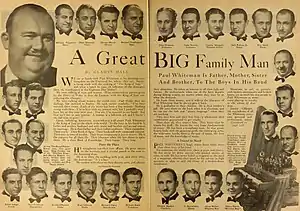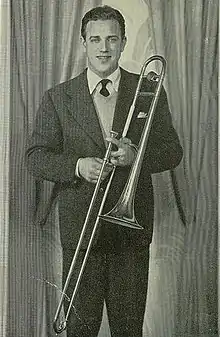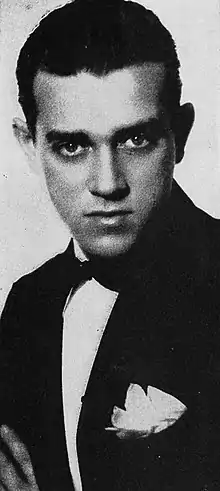Jack Fulton
John Collins Fulton (June 13, 1903 – November 13, 1993) was an American composer, trombonist, and vocalist. At the age of 17, he started playing the trombone for small-town dances. He sang with the Mason-Dixon Orchestra. He also played the trombone and sang with the George Olsen Orchestra. He was part of the trio that sang on the 1925 number one hit "Who?"[1] The other vocalists were Bob Rice and Fran Frey.[2][3]

Jack Fulton | |
|---|---|
 | |
| Background information | |
| Birth name | John Collins Fulton |
| Born | June 13, 1903 Philipsburg, Pennsylvania |
| Died | November 13, 1993 (aged 90) San Diego, California |
| Genres | Jazz |
| Occupation(s) | Composer, trombonist, and vocalist |
| Instrument(s) | Trombone and tenor voice |
In 1926, he joined the Paul Whiteman orchestra.[4] He provided the vocals for many Whiteman recordings. He was part of a trio with Charles Gaylord and Austin Young on a recording of "Makin' Whoopee."[5] They sang with The Rhythm Boys on their 1927 recording of "Changes" and accompany Bing Crosby and Bix Beiderbecke during their solos.[6] He appeared in King of Jazz as a part of the orchestra, briefly singing "A Bench in the Park". With the orchestra, he popularized the song "Body and Soul" in 1930. He introduced the song "How Deep Is the Ocean?" in 1932.[5]

He wrote around 120 compositions, including "Wanted", "Until", "If You Are But a Dream", and "My Greatest Mistake" – his first hit (1940).[4]
References
- "Jack Fulton; Big-Band Singer Wrote Hit Perry Como Song". Los Angeles Times. November 21, 1993. Retrieved January 30, 2016.
- "Victor matrix BVE-33856. Who / George Olsen and his Music". Discography of American Historical Recordings. UC Santa Barbara Library. 2016. Retrieved January 30, 2016.
- "Jack Fulton," Radio Personalities, Press Bureau Incorporated (1935), p. 197
- Fulton, Pierce (January 4, 2010). "Pierce Fulton's DNA". pfulton1. Wikispaces. Retrieved January 30, 2016.
- Burlingame, Sandra (2008). "Jack Fulton". JazzBiographies.com. JazzBiographies.com. Retrieved January 30, 2016.
- "Changes". University of Virginia. University of Virginia. July 25, 2006. Retrieved February 2, 2016.